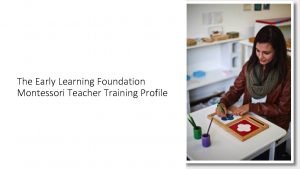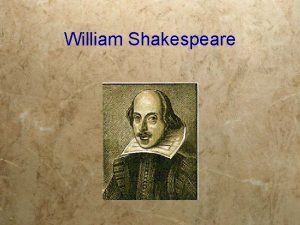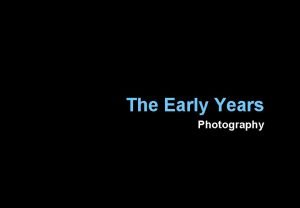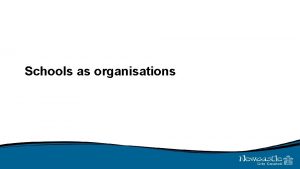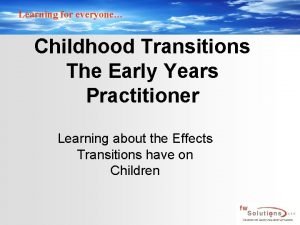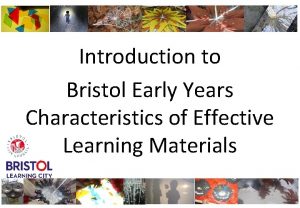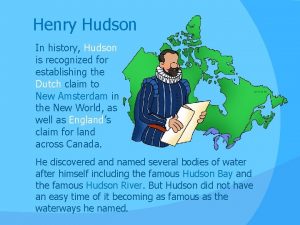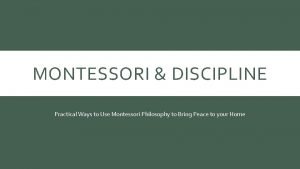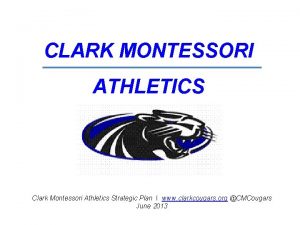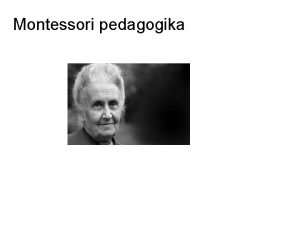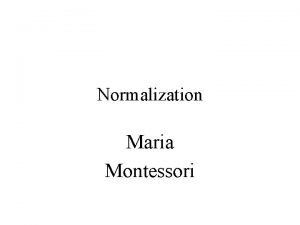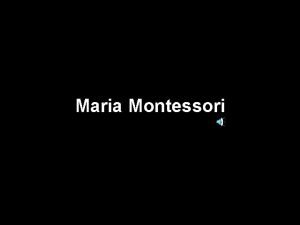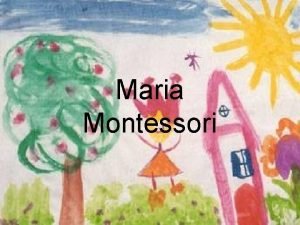Use of technology in Early Years Montessori St











- Slides: 11

Use of technology in Early Years Montessori St Nicholas Julie Compton

Kolb’s Learning Cycle “…do something, think about what you did, come to conclusions about what you did and plan to try again. ” (Kolb, 1984) o Doing: having an experience o Reviewing: reflecting on the experience o Concluding: learning from the experience o Planning: trying out what you have learned

Doing: having an experience Practitioner research was conducted, posing the following question: What are the views of parents/carers, practitioners and young children themselves with regard to the use of technology in Early Years? Using a qualitative approach, I employed the following methods: o Parent/carer questionnaires o Practitioner questionnaires o Observations of and conversations with children o Photographs of and by children

Children’s perspectives (conversations, observations, photos) Drawing from the ‘Mosaic Approach’ (Clark & Moss, 2011): children engaged in conversations with and observations by staff; took photos to capture favourite activities (technology-based or other) in the setting/at home. Bee-bot

Practitioner questionnaire What technologies are you aware of that are available specifically for the Early Years? Do you have any concerns about technology use by young children? What advice do parents/carers need with regard to technology use by young children? Are you aware of any sources of guidance for parents/carers? Metal detectors

Parent/carer questionnaire What use does your child make of technology at home? Do you think technology contributes to a young child’s learning and development? Do you have any concerns about technology use by young children? Have you sought any advice on this topic?

Reviewing: reflecting on (and in) action “Competent practitioners usually know more than they can say. They exhibit a kind of knowing-in-practice, most of which is tacit. . . ” (Schon, 1983, p 8)

Concluding: learning from the experience What might I have done differently? o Provided feedback to parents/carers - engagement with topic was high. Followed up by interviewing parents/carers to obtain clarification/further data to ensure that families benefit from potential changes. o Revised practitioner questions (feedback: ‘the questions were really hard’). Focus-group method might have proved less onerous, generated more data, increased participation, taken less time - time is limited. o Expanded use of Mosaic Approach (Clark & Moss, 2011). o Ethical considerations (Roberts-Holmes, 2013): were children aware of final usage of data?

Planning: trying out what you have learned o Devise ‘toolkit’ including current guidelines/resources/literature list for parents/carers re. technology use by/for young children o Clarify staff training needs re. implementing technology, e. g. use of resources/practice guidelines/providing guidance for parents/carers. o Embed ‘camera at home’ project into continuous provision – including daily ‘slide show’ in setting, available to children and parents/carers. o Make more time for reflection as a team: staff meetings focusing on specific topics to develop “…the ’critical’ in critical reflection as a tool for organisational learning and change” (Fook, 2010, p. 50).

Resources Clark, A. & Moss. P. (2011) Listening to Young Children: The Mosaic Approach, 2 nd edition. London: NCB Df. E (2014), Statutory framework for the Early Years foundation stage. Available at: http: //www. gov. uk/government/publications Fook, J. (2010) ‘Beyond reflective practice: reworking the ‘critical’ into critical reflection. ’ In Bradbury, H. et al. Beyond reflective practice: new approaches to professional lifelong learning. London: Routledge Hallet, . E. (2013) The Reflective Early Years Practitioner. London: Sage Publications Kolb, D. A. (1984) Experiential Learning. New Jersey: Prentice Hall Plowman, L. & Mc. Pake, J. (2013), Seven Myths About Young Children and Digital technology, Childhood Education, Vol 89, Issue 1, pp 27 -33, available at: http: //www. tandfonline. com/toc/uced 20/89/1

Resources (cont. ) Prensky, M. (2001) Digital Natives, Digital Immigrants, On the Horizon, Vol. 9, No. 5. NCB University Press, available at: http: //www. marcprensky. com/writing/Prensky%20%20 Digital%20 Natives, %20 Digital%20 Immigrants%20 -%20 Part 1. pdf Price, H. , ed. (2009), The Really Useful Book of ICT in the Early Years. Oxon: Routledge Roberts-Holmes, G. (2014) Ethical Issues in Early Childhood Research, Doing your Early Years Research Project: a step by step guide, 3 rd edition. London: Sage Publications Schon, D. (1983), The Reflective Practitioner. London: Temple Smith
 Maria montessori birth and death
Maria montessori birth and death Mtt teacher training
Mtt teacher training Goat years to human years
Goat years to human years 300 solar years to lunar years
300 solar years to lunar years Four score and twenty years ago
Four score and twenty years ago Shakespeare early years
Shakespeare early years Early years photography
Early years photography Summarise types of early years provision
Summarise types of early years provision Big builders medway
Big builders medway Effects of transitions in early years
Effects of transitions in early years Bristol early years
Bristol early years Early life of henry hudson
Early life of henry hudson

